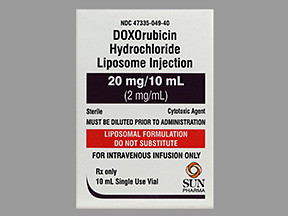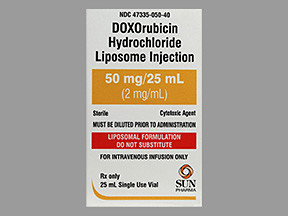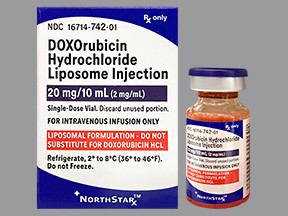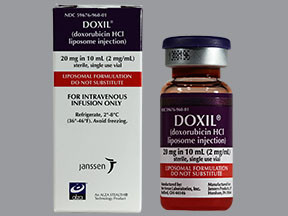DOXORUBICIN LIPOSOMAL - INJECTION
PHONETIC PRONUNCIATION: (DOX-oh-ROO-bi-sin LYE-poe-SOE-mal)
COMMON BRAND NAME(S): Doxil
GENERIC NAME(S): doxorubicin HCl pegylated liposomal
Uses
USES: Liposomal doxorubicin is an anthracycline-type chemotherapy drug that is used alone or with other treatments/medications to treat certain types of cancer (e.g., ovarian cancer, AIDS-related Kaposi's sarcoma, multiple myeloma). It works by slowing or stopping cancer cell growth.
How to use DOXORUBICIN LIPOSOMAL - INJECTION
HOW TO USE: This medication is given by injection into a vein over 30-60 minutes or longer by a health care professional. The dosage is based on your medical condition, body size, and response to therapy. Notify your doctor right away if redness, pain, or swelling occur at or near the injection site. If this medication touches your skin, immediately and completely wash skin with soap and water. If this medication gets in your eye, open the eyelids and flush with plenty of water for 15 minutes. Seek immediate medical attention. Family members and caregivers should take precautions (e.g., wear gloves) to prevent contact with the patient's urine or other body fluid for at least 5 days after treatment. Consult your pharmacist.
Side Effects
Precautions
Interactions
Overdose
Images

- color
- red
- shape
- imprint

- color
- red
- shape
- imprint

- color
- red
- shape
- imprint

- color
- red
- shape
- imprint
Reviews
Faq for DOXORUBICIN LIPOSOMAL - INJECTION
Doxorubicin liposomal injection is a medication used for the treatment of various types of cancer, including breast cancer, ovarian cancer, and leukemia. It contains a liposomal form of the chemotherapy drug Doxorubicin.
Doxorubicin liposomal works by interfering with the growth and spread of cancer cells. The liposomal formulation helps to deliver the medication directly to the tumor site, reducing the potential damage to healthy cells.
The common side effects of Doxorubicin liposomal injection include nausea, vomiting, diarrhea, fatigue, mouth sores, hair loss, and decreased appetite. It may also cause temporary discoloration of bodily fluids, such as urine and tears, turning them red.
Doxorubicin liposomal injection is administered by a healthcare professional as an intravenous infusion. The dosage and frequency of administration are determined by the patient's individual condition and response to treatment.
Patients receiving Doxorubicin liposomal should be closely monitored for any signs of infection, excessive bleeding, or heart-related issues. It is important to inform the healthcare provider about any other medications or supplements being taken, as they might interact with Doxorubicin liposomal.
Some potential serious side effects of Doxorubicin liposomal injection include severe allergic reactions, heart problems, bone marrow suppression, and increased risk of secondary cancers. It is crucial to discuss the risks and benefits of this treatment with the healthcare provider.
In general, live vaccines should be avoided during Doxorubicin liposomal treatment due to potential interactions. However, specific vaccination guidelines should be discussed with the healthcare provider.
The effectiveness of Doxorubicin liposomal can vary depending on the individual and the type of cancer being treated. It is important to follow the prescribed treatment schedule and consult with the healthcare provider regarding the expected response time.
Doxorubicin liposomal injection is classified as a pregnancy category D drug, meaning it can harm an unborn baby. It is not recommended for use during pregnancy or breastfeeding, unless the potential benefits outweigh the risks and it is approved by the healthcare provider.
Warning
WARNING: Liposomal doxorubicin may cause heart problems, including possibly fatal heart failure. Heart problems may occur during liposomal doxorubicin therapy or months to years after receiving this medication. Your risk of developing heart problems depends on your dose, medical history (including previous heart disease, radiation therapy in the chest area), and previous use of this and other drugs (including daunorubicin and cyclophosphamide). Children are at higher risk and should be monitored later in life for delayed heart problems. See also Side Effects section. This medication may cause certain severe (rarely fatal) blood disorders (bone marrow suppression leading to low red blood cells/white blood cells /platelets). This can lower your body's ability to fight infection and stop bleeding. Tell your doctor right away if you develop any signs of infection (e.g., fever, chills, persistent sore throat), unusual tiredness, or easy bleeding/bruising. While this drug is first being given into your vein, this medication may cause severe (rarely fatal) reactions, including allergic reactions. Tell your doctor right away if you experience flushing, trouble breathing, swelling of the face, tightness in the chest/throat, chills, back pain, severe dizziness, or fast heartbeat. See also Side Effects section. Tell your doctor if you have liver problems because the dose may need to be decreased. Your doctor will closely monitor you while you are being treated with this medication. Different types of this medication work in different ways. Do not switch types of this medication without your doctor's permission.
Disclaimer
IMPORTANT: HOW TO USE THIS INFORMATION: This is a summary and does NOT have all possible information about this product. This information does not assure that this product is safe, effective, or appropriate for you. This information is not individual medical advice and does not substitute for the advice of your health care professional. Always ask your health care professional for complete information about this product and your specific health needs.


No Reviews Yet